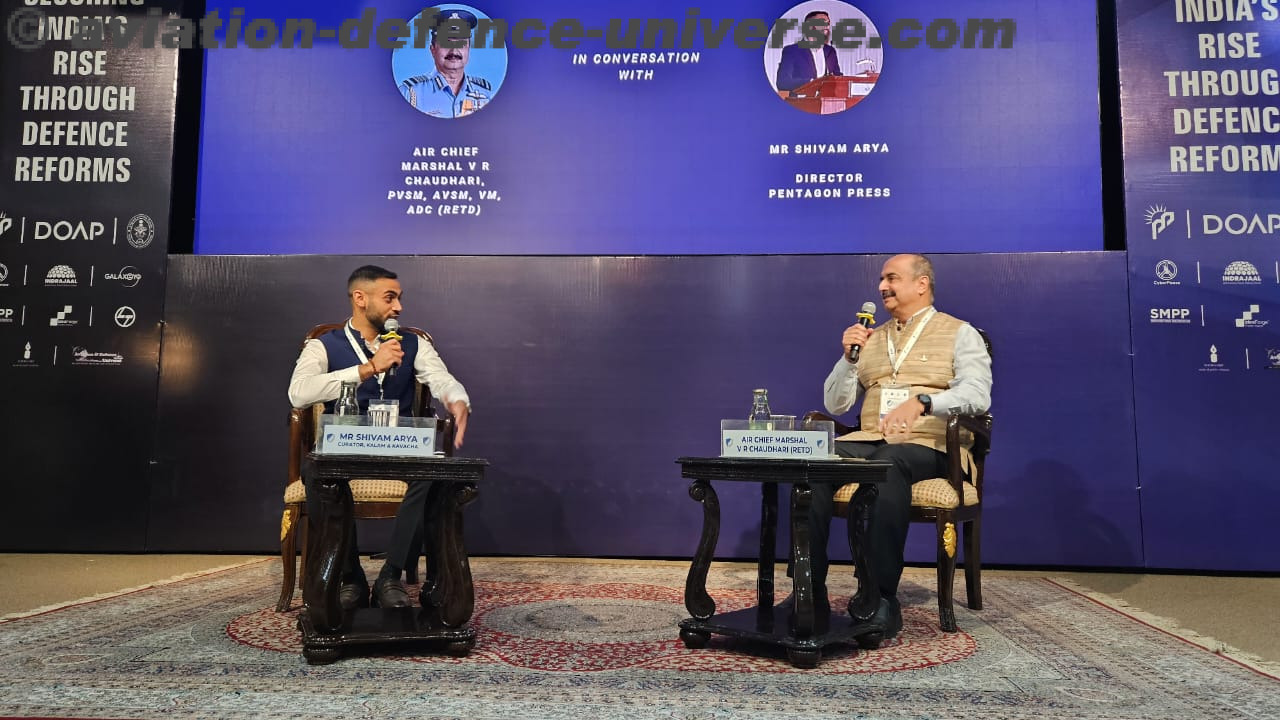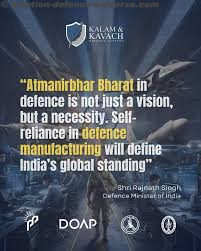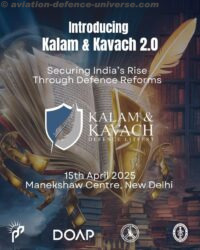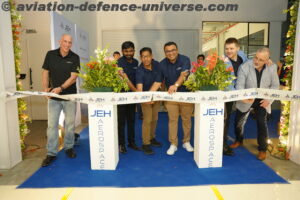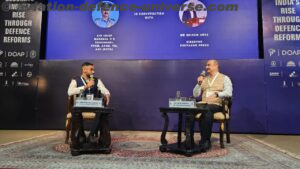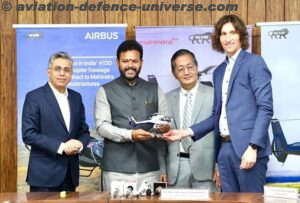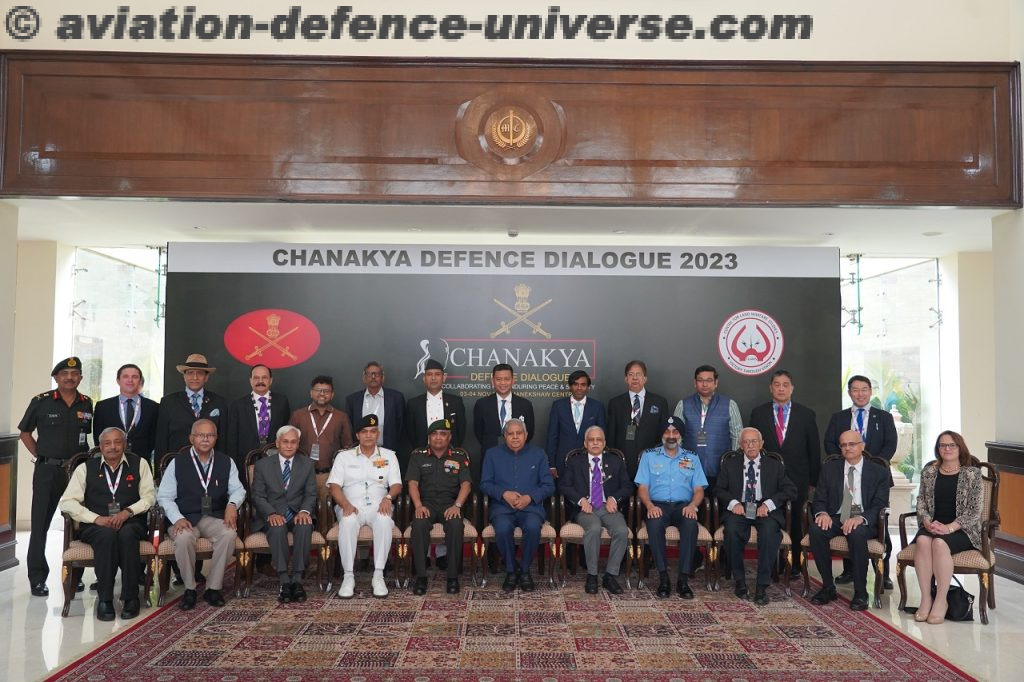 New Delhi. 05 November 2023. The Chanakya Defence Dialogue 2023, a two-day groundbreaking event steered by the Indian Army in collaboration with the Centre for Land Warfare Studies (CLAWS), concluded on 4th November with takeaways on Security Challenges in South Asia and the Indo-Pacific. The event organised in Manekshaw Centre on 3rd and 4th November, in six different sessions, was centred around the theme, ‘Serving India and Indo Pacific Region- Collaborating for Comprehensive Security’. The Dialogue, inspired by the sagacity of the ancient strategist Chanakya, unfolded crucial discussions on global and regional security issues with a distinctive emphasis on South Asian and Indo-Pacific security dynamics, a roadmap for collaborative security in the region, optimisation of emerging technologies for defence and security, ways to enhance the collaborative capacity of the Indian defence industry and options for India to achieve comprehensive deterrence.
New Delhi. 05 November 2023. The Chanakya Defence Dialogue 2023, a two-day groundbreaking event steered by the Indian Army in collaboration with the Centre for Land Warfare Studies (CLAWS), concluded on 4th November with takeaways on Security Challenges in South Asia and the Indo-Pacific. The event organised in Manekshaw Centre on 3rd and 4th November, in six different sessions, was centred around the theme, ‘Serving India and Indo Pacific Region- Collaborating for Comprehensive Security’. The Dialogue, inspired by the sagacity of the ancient strategist Chanakya, unfolded crucial discussions on global and regional security issues with a distinctive emphasis on South Asian and Indo-Pacific security dynamics, a roadmap for collaborative security in the region, optimisation of emerging technologies for defence and security, ways to enhance the collaborative capacity of the Indian defence industry and options for India to achieve comprehensive deterrence.
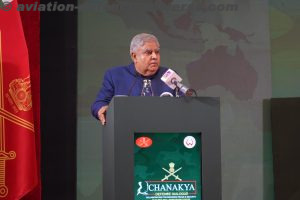 Jagdeep Dhankhar Vice President of India graced the occasion and delivered a Special Address on 3rd November 2023. Vice President congratulated the Indian Army for the conception of this ideation forum to dissect contemporary challenges to global security and peace. He expressed confidence that Chanakya Defence Dialogue will turn out to be a well-suited platform for in-depth analyses of security complexities in South Asia and the Indo-Pacific, ultimately paving the way for collective security solutions in the region.
Jagdeep Dhankhar Vice President of India graced the occasion and delivered a Special Address on 3rd November 2023. Vice President congratulated the Indian Army for the conception of this ideation forum to dissect contemporary challenges to global security and peace. He expressed confidence that Chanakya Defence Dialogue will turn out to be a well-suited platform for in-depth analyses of security complexities in South Asia and the Indo-Pacific, ultimately paving the way for collective security solutions in the region.
He underscored the paramount importance of achieving and upholding peace through a multifaceted approach, combining ideation, advocacy, outreach, persuasion, and dialogue, while also being vigilant and prepared. He also noted that “being prepared for war is a pathway to peace,” further emphasizing that a nation’s strength stands as the most impactful defence and deterrent. He mentioned that peace can be established by possessing strength. In addition, he highlighted the significance of harnessing a nation’s soft power and economic strength as integral components in enhancing the security environment.
Highlighting the emergence of deep technologies like AI, robotics, quantum, semi-conductors, biotechnology, drones and hypersonic, Vice-President stressed that “Prowess and mastery of these domains will determine the strategic haves and have-nots of the future”.
Commenting on the aspect of technology, he also said that technology is changing the character of war and there is a need to continuously build our capabilities to meet such like changes and challenges. He also remarked that India’s capabilities in space, cyber and the electromagnetic spectrum are complementing the traditional domains of land, sea and air.
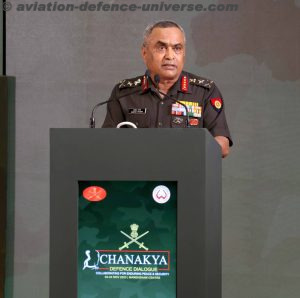 General Manoj Pande, Chief of the Army Staff (COAS), delivered a plenary address. The COAS mentioned that the unprecedented churn in the global landscape has set into motion a chain of events and new trend lines. He said that the technology is driving geo-politics like never before and emerging as a new strategic arena of geo-political competition.
General Manoj Pande, Chief of the Army Staff (COAS), delivered a plenary address. The COAS mentioned that the unprecedented churn in the global landscape has set into motion a chain of events and new trend lines. He said that the technology is driving geo-politics like never before and emerging as a new strategic arena of geo-political competition.
He highlighted that India’s resolve, resilience and diverse capacities were put through a severe test during the Pandemic and our nation rode the storm well. He also remarked that agile, resilient, consumer-driven economy of our nation helped us to brave the economic downturn of the Russia Ukraine conflict. He added that India has a credible voice on the world stage, one that is distinct, rooted in Indian ethos and effective in articulating the concerns of the Global South.
He also mentioned that India’s defence cooperation outreach is being enhanced. Highlighting the importance of military diplomacy in India’s multilateral engagement efforts, he remarked that the scope and scale of joint exercises with friendly foreign partner nations have been enhanced. He iterated the national resolve to achieve self-reliance in defence hardware, that is being enabled by a resurgent Indian Defence Industry.
He envisioned that the outcome of the Chanakya Defence Dialogue is to foster collaborative efforts to address global issues and pilot the course of comprehensive security, within India’s neighbourhood Indo-Pacific, with the perspective of ensuring the safety of the global commons.
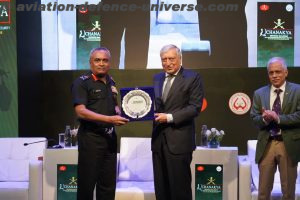 He also remarked that the security discourses, such as this Dialogue, among like-minded countries, assume importance because of common interests and values India shares with them such as democracy, human rights, and the rule of law etc. He reiterated that India’s outlook emphasises respect for the sovereignty and territorial integrity of all nations, equality of all, peaceful resolution of disputes, avoidance of use of force and adherence to international laws, rules and regulations.
He also remarked that the security discourses, such as this Dialogue, among like-minded countries, assume importance because of common interests and values India shares with them such as democracy, human rights, and the rule of law etc. He reiterated that India’s outlook emphasises respect for the sovereignty and territorial integrity of all nations, equality of all, peaceful resolution of disputes, avoidance of use of force and adherence to international laws, rules and regulations.
Eminent speakers such as Dr Arvind Virmani (Niti Aayog), Prof Ajay Kumar Sood (PSA to Govt of India), Ambassador V Misri (Deputy NSA), Vijay K Gokhale, Ambassador Ashok K Kantha, Admiral Sunil Lanba (Retired), Lieutenant General Prakash Menon (Retired), Lieutenant General Subrata Saha (Retired) and Lieutenant General DS Hooda (Retired), bestowed their insights, thus enriching the dialogues. The international delegations from nations across the globe including the USA, Australia, France, Japan, Indonesia, Bangladesh, Sri Lanka, The Philippines and Nepal, among others, contributed to the discussions with diverse perspectives and collaborative spirits.
Vijay K Gokhale while delivering his Keynote Address on the first day, highlighted ongoing transitions in the world. He mentioned that global balance is now shifting from West to East. He also highlighted the role of technology in empowering all equally, which does not remain exclusive to the West anymore. He remarked that India needs to play a leading role in the emerging world order and for that, India has to work closely with all including USA and China.
Session I- Neighbourhood First; South Asia Prognosis: The first session was chaired by Ambassador Ashok K Kantha. Lieutenant General Rakesh Sharma (Retired), Ambassador Shamsher M Chowdhury (Bangladesh), Asanga Abeyagoonasekera (Sri Lanka) and Chiran Jung Thapa (Nepal) delivered talks and participated in the discussion during the session. The discussion focussed on likely future challenges in South Asia and the ways forward for the region to deal with them. The session analysed the implications of India-China competition and the prospect of India as a geo-economic growth driver in South Asia. Besides, the session also considered non-traditional and contemporary security issues like human migration, ethnic divide, resource sharing, political divergence and climate change to enable a peaceful and prosperous future for South Asia.
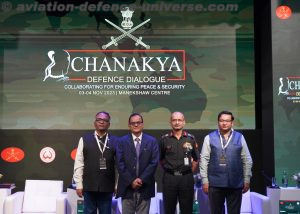 Session II- Indo Pacific; The Decisive Frontier: The second session was chaired by Former Chief of the Naval Staff Admiral Sunil Lanba (Retired). Dr Troy Lee Brown (Australia), Vice Admiral Amarulla Octavian (Indonesia), Lisa Curtis (US) and Saurabh Kumar (India) delivered talks and participated in discussion, which dived deep into the shifting power dynamics in the Indo-Pacific, emphasizing India’s role as an economic powerhouse, China’s influence in the region and the crucial involvement of ASEAN Nations in shaping the region’s fate. Lisa Curtis said that Indo-Pacific is turning out to be a region of growing competition. Towards this QUAD, a non-military alliance, is likely to emerge as a successful multi-lateral organisation. Saurabh Kumar highlighted the peculiarities of India’s vision for Indo-Pacific Region and various initiatives taken by India. He reiterated the importance of QUAD as a potent platform to deal with contemporary challenges.
Session II- Indo Pacific; The Decisive Frontier: The second session was chaired by Former Chief of the Naval Staff Admiral Sunil Lanba (Retired). Dr Troy Lee Brown (Australia), Vice Admiral Amarulla Octavian (Indonesia), Lisa Curtis (US) and Saurabh Kumar (India) delivered talks and participated in discussion, which dived deep into the shifting power dynamics in the Indo-Pacific, emphasizing India’s role as an economic powerhouse, China’s influence in the region and the crucial involvement of ASEAN Nations in shaping the region’s fate. Lisa Curtis said that Indo-Pacific is turning out to be a region of growing competition. Towards this QUAD, a non-military alliance, is likely to emerge as a successful multi-lateral organisation. Saurabh Kumar highlighted the peculiarities of India’s vision for Indo-Pacific Region and various initiatives taken by India. He reiterated the importance of QUAD as a potent platform to deal with contemporary challenges.
Session III- Collaborative Partnership for Security: The third session was chaired by Lieutenant General Prakash Menon (Retired). It witnessed participation from Dr Satoru Nagao (Japan), Ms Vani Sarraju Rao (India) apart from Dr R De Castro (Philippines) and Dr Paco Milheit (France). The session spotlighted potential security alliances in the Indo-Pacific, drawing from historical ties and projecting future alliances within the global spectrum, emphasizing the importance of multilateral alignments based on shared interests, especially for the security of the region’s smaller nations. While highlighting strong India-USA relations, Ms Vani S Rao highlighted settlement of trade disputes in WTO, high academic linkages and enhanced defence cooperation. She also mentioned that this defence partnership is bilateral and not regional. She also remarked that the QUAD is a Plurilateral platform that provides viable solutions to issues of common interests including HADR, maritime security, health security etc.
The Day 2 commenced with the Special Address by Ambassador Kanwal Sibal who talked about options for India amidst ongoing global affairs. He stressed that India must continue maintaining strategic autonomy without being a fence sitter and maintain friendly relations with all like-minded nations. Keynote Address for Day 2 of the dialogue was delivered by Dr Arvind Virmani from Niti Aayog who highlighted India’s vision to be a responsible power in the emerging world order. He visualised India attaining the status of a great power by mid-21st century with USA and China being the superpowers.
Session IV- How Emerging Technology Impact Defence and Security: The fourth session was chaired by Prof Ajay Kumar Sood, Principal Scientific Advisor to the Government of India. The session witnessed talks and discussion on critical aspects of emerging technologies to include Space, Cyber Space, AI and Big Data covered by eminent speakers to include Dr Umamaheswaran R (Former Director of Human Space Flight Centre, Bangalore), Prof V Kamakoti (IIT Madras) and Prof Mayank Vatsa (IIT Jodhpur) respectively. The Session examined the impact of new technologies on defence and security to help build a clearer picture for the upcoming years. It encompassed the challenges and potential of disruptive technologies, with a focus on India’s defence capabilities and preparedness for multi-domain conflicts in the face of global technological advancements, to integrate innovations with defence strategies.
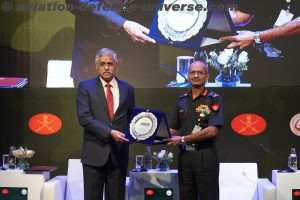 Giridhar Aramane, Defence Secretary in his address highlighted the importance of Atmanirbharta or Self Reliance in Defence. While highlighting India’s key achievements in the field of Defence Diplomacy, he talked about India’s contribution in training of military personnel of friendly foreign countries and participations in Bilateral and multilateral Joint Exercises. He also talked about India’s role of being first responder in Indian Ocean Region besides contributions in HADR, coastal security and maritime awareness.
Giridhar Aramane, Defence Secretary in his address highlighted the importance of Atmanirbharta or Self Reliance in Defence. While highlighting India’s key achievements in the field of Defence Diplomacy, he talked about India’s contribution in training of military personnel of friendly foreign countries and participations in Bilateral and multilateral Joint Exercises. He also talked about India’s role of being first responder in Indian Ocean Region besides contributions in HADR, coastal security and maritime awareness.
Session V- Indian Defence Industry as Enabler for Collaborative Capacity Building: The fifth session was chaired by Lieutenant General Subrata Saha (Retired) which saw participation from Commodore AP Golaya, RS Bhatia and R Shiva Kumar on the topics ‘Policy Initiatives’, ‘Industry Collaboration’ and ‘Start Ups’ respectively. Key takeaway of session V was that India should prepare to win future wars with Indian solutions. The discussions focussed on the capabilities, potential and future trajectory of the Indian defence industry and its pivotal role in collaborative and individual capacity building. It analysed the role of policy frameworks, the DRDO, private defence sectors and MSMEs in enhancing India’s defence capabilities, both domestically and through international partnerships.
Session VI- Comprehensive Deterrence- The India Way: The sixth and last session was chaired by Lieutenant General DS Hooda (Retired). Ambassador DB Venkatesh Varma and Colonel KPM Das (Retired) delivered talks on the topics of Diplomacy and Technology. The focus of the session was to explore India’s unique approach to comprehensive deterrence, unravelling its philosophy, practicalities and future developments including China’s assertiveness and regional economic downturns influenced by various crises.
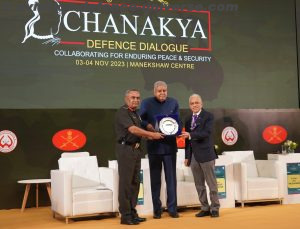 In his closing remarks, the COAS highlighted some of the key aspects discussed during various sessions. He iterated India’s commitment in promoting regional stability and shared prosperity. He highlighted that Indo- Pacific remains central in the world’s strategic discourse and iterated that ‘Deterrence’ should not be allowed to fail in this region.
In his closing remarks, the COAS highlighted some of the key aspects discussed during various sessions. He iterated India’s commitment in promoting regional stability and shared prosperity. He highlighted that Indo- Pacific remains central in the world’s strategic discourse and iterated that ‘Deterrence’ should not be allowed to fail in this region.
He also underscored the importance of collaborative security and partnership amongst like-minded nations to achieve regional stability through military balance, as well as address transnational threats. He also noted that kinetic instruments of war have also undergone notable technological progression, and cumulatively, the battle space has become more complex, contested and lethal. He mentioned that niche technology does not remain superpower centric anymore.
Talking about the Indian Defence Industry, he mentioned that Government of India has facilitated industry’s progression through enabling policies, establishment of Defence Industrial Corridors and handholding by multiple stakeholders. This has helped the Defence Industry rise to the challenges and efforts have commenced to show results.
He also remarked that comprehensive deterrence recognises the importance of a holistic approach to security, and it encompasses military, economic, diplomatic, technology and informational elements.
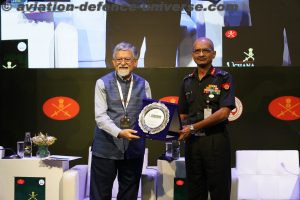 Summing up his remarks, General Manoj Pande said that the Peace is secured from a position of strength and the strength comes from unity of like-minded nations who respect international norms. He mentioned that the collective and collaborative security partnerships is the way ahead. The event came to end with a Vote of Thanks to all speakers and participants by Lieutenant General MV Suchindra Kumar, Vice Chief of the Army Staff.
Summing up his remarks, General Manoj Pande said that the Peace is secured from a position of strength and the strength comes from unity of like-minded nations who respect international norms. He mentioned that the collective and collaborative security partnerships is the way ahead. The event came to end with a Vote of Thanks to all speakers and participants by Lieutenant General MV Suchindra Kumar, Vice Chief of the Army Staff.
The Chanakya Defence Dialogue 2023 sowed the seeds for a future where discussions, ideas and strategies germinate into a secure, stable and prosperous global and regional environment. India, with its rich heritage and futuristic vision, stands resilient and welcoming, ready to play a pivotal role in the comity of nations towards collective security and prosperity in the region, near and far.












